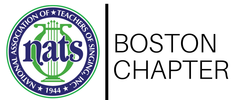|
Name: Justin Petersen
Hometown: Peculiar, MO Voice type: The Fachless Wonder Performance Genre(s): Classical and Musical Theater Number of Years Teaching: 22 years Singing Genre(s) Taught: Classical, Musical Theater, Jazz, Pop, and Rock Primary Age of Students: I teach all age ranges from 12-55 Current Teaching Employment: I have a private practice in Watertown and Allston, and I also work as the Lead Song Coach for My College Audition, preparing high school students for the competitive music theater college audition experience. What brought you to singing and then to teaching? I started singing at 2, and began singing professionally as a young singer at 10 years old in various opry houses throughout the state of Missouri where I grew up. I was active in choir in my high school and fell in love with opera at 16 after watching the films of Jeanette MacDonald and Nelson Eddy. I decided to pursue a music education at Simpson College where I performed in operas and then went on to sing with the Des Moines Metro Opera. I began teaching after much contemplation. When I was in graduate school I taught the Opera Workshop and Voice, and realized that I really loved teaching. I knew nothing about the voice (outside my own vocal studies and knew that the education would not be sufficient, so I began to read every book on singing that I could find, and accumulated a rather large library of texts on singing, which helped to formulate my pedagogical thinking, in addition to the work of teachers and colleagues that influenced my journey as well. What was your biggest “ah-hah” moment in teaching voice? I’ve had SO many, and I continue to have MORE of these moments the longer I teach. Mainly the ‘a-ha’ is a reminder that I need to simplify in lessons. Too much knowledge can drive a man mad, and the students are left none the better after an in-depth explanation or ‘sermon’ as I like to call them. I have had so many of these moments in relationship to all the aspects of singing: breath, singing, resonance, performance, interpretation, and expression. It enlivens the teaching process for sure. I know enough to know how a voice will respond, but I always stay open to what actually occurs! What has been your biggest obstacle in teaching and how have you overcome/are you overcoming it? I’d have to say the biggest obstacle for me is the inherent loneliness of teaching. Sitting at a piano all day long with students and maintaining a professional demeanor, it can get quite lonely because I don’t have ‘water cooler’ moments with colleagues that office workers or other types of fields have. I’m very social and love people, and I am trying to make more friends but it has been difficult to do. Can you share your funniest teaching moment? Hard for me to seize on one moment because I try to make all my lessons a fun and joyful experience! What skill(s) do you think are most important when it comes to being a quality voice teacher? So many - too many in fact. The most valuable tool is the diagnostic ear and then knowing HOW to remedy the issue. It is a marriage between understanding function and knowing how to influence that function. Couple that with a kind, empathetic, PATIENT, and listening temperament and you have what I would consider a good start to being a quality teacher. The educational experience is all about the student, not the teacher or their ego or own insecurities. What do you love and/or dislike most about teaching singing? I love the discovery of voice lessons. I love that no two lessons are the same and the ability to respond in the moment to every student’s needs, no matter how they are feeling. I love enabling a person to come into a greater relationship and intimacy with their own body through sound. I also love lightbulb moments when after a long period of ‘tending to the garden,’ the flowers finally begin to blossom in the voice. The labor of patience and work involved in waiting...waiting...waiting...as the voice becomes freer and more easy in movement, flexibility, and dynamic contrast. And to the things I dislike? Sometimes the fact that much of the profession seems to be locked in a state of egoic argumentation over the smallest of nits, and the because much of our communication is done virtually, we don’t foster true authentic relationships with our colleagues built upon mutual trust and collegiality. We rush to judgement and scorn or deride others based on incomplete information. I think the voice teaching profession by and large needs to have a serious conversation with itself about mental health and how that manifests in our interactions and in our teaching. Most Importantly: Coffee or Tea? In the mornings, coffee; at night, tea.
1 Comment
|
AuthorNATS BOSTON Archives
January 2020
Categories |

 RSS Feed
RSS Feed